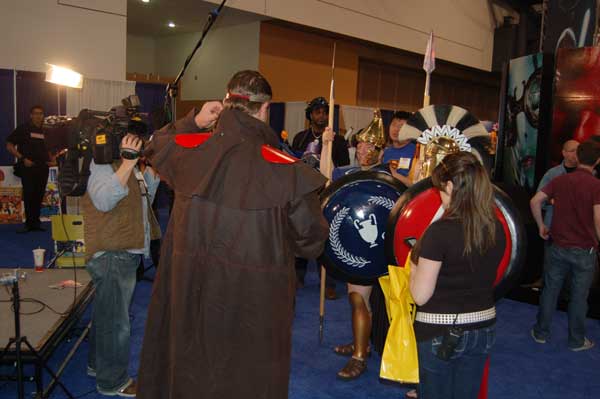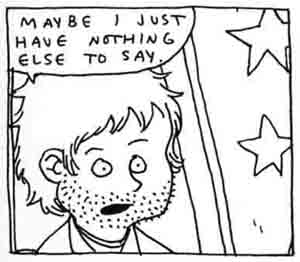
On Friday afternoon, I began walking the floors of New York ComicCon, collecting strange snippets that will be glued together for a future installment of Segundo. I counted thirty-seven Jedi Knights (some of them portly, making me wonder why Jedi discipline doesn’t seem to involve physical fitness), two Stormtroopers (both in good shape), and two Princess Leias (both in remarkably gaunt shape and dressed to show this). If one must choose a side in the Star Wars/Star Trek dichotomy, I’m more of a Trek man myself, even though I recognize that the franchise is dead and hasn’t produced anything of quality since Deep Space Nine. Nevertheless, if costumes are anything to go by, there is a distinct sign that Trek is on the wane with the true believers.
I’m not quite sure what Roman centurions and Jedi knights have in common, aside from the fact Asimov’s Foundation series serves as the missing link between the two. But I must confess that, of all the costumes I espied, I was the most impressed with the Centurions (pictured above).
Speaking of Star Wars, I learned about the economics of lightsabers. A good lightsaber will cost you around $100. More if you want it customized. Joseph Semling, purchasing manager of Brian’s Toys, told me that he has anywhere from 20 to 100 lightsabers of any particular type in his warehouse. And if you’re wondering what a lightsaber dealer is likely to net, a lightsaber goes wholesale for about $75 and is then sold from anywhere from $25 to $50 more at retail. And if you’re wondering how Semling makes his money, he informed me that he raises the price of his lightsabers when the supply goes down. Like anything, the lightsaber is subject to a supply and demand curve. But even if the supply remains relatively stagnant, I suspect if Semling moved six lightsabers a day, discounting overhead, he could probably pay for his New York hotel room.
But the most intriguing conversation I had was with Jeffrey Brown, whose work I was apparently more interested in than I realized and whom I may have profoundly confused with my line of questioning. I’ll let the following partial transcript speak for itself. But Brown, I suspect, has more going on in his personal chronicles than most people realize. And I’m hoping that one day, I’ll be able to sit down with him and give him the full-length treatment he deserves.
Brown: I don’t really write about my personal sex anymore.
Correspondent: I know. But I’m saying that people are still interested in the past.
Brown: Yeah.
Correspondent: So this might be a conundrum. Many people are expecting more of that in the present and the future.
Brown: Well, um, I just keep dangling it in front of them. Well, that sounds bad.
Correspondent: (laughs)
Brown: What I mean to say is that maybe I can just make it seem like I might write more. But I’ll really just write whatever I want.
Correspondent: Okay, I propose something for you. What if you were to fictionalize the personal and therefore it’s not personal sex. But it’s fictional sex. I mean, you did that with the robots. But to have a story that doesn’t involve you as the chief protagonist.
Brown: I have lots of ideas and I’ve got a couple more autobiographical things that I want to cover. Including writing about religion. Growing up with my dad being a minister. And I want to write a book about pregnancy. And the book I’m working on right now is about becoming a cartoonist. And then once those are out of the way, I have some ideas about fiction-like stories that I want to get into. Although the first one, at least, there’s no sex. Well, there could be. I don’t know. I haven’t written it yet.
Correspondent: Well, it’s not all sex. I’m just trying to point out the first-person vs. third person vs. fictive vs. real and all that.
Brown: Well, if you don’t know me, I guess it’s all fiction writing.
Correspondent: I don’t actually. I don’t know you.
Brown: Well, you kinda do.
Correspondent: Well, not entirely. Because this is entirely true. That’s the question.
Brown: But to people listening to this, they don’t know.
Correspondent: Well, now they know. Now that we’re talking about it. We’re clarifying.
Brown: But to them. To them, this could be fiction.
Correspondent: Oh, you may not even be Jeffrey Brown.
Brown: That’s true.
Correspondent: Okay, so let’s talk about this reality vs. what you put in your books.
 Brown: Well, it’s something. And I haven’t entirely figured out why. I mean, there’s something about when you know it’s true. There’s something about that honesty, that authenticity, that kind of heightens the impact of things sometimes. Which is why I’ve avoided doing more fictionalized autobiography. And sometimes I’ve thought about moving in that direction. And then it just doesn’t feel right for what I’ve done so far. But on the other hand, books — like some of the Bighead stuff — there are some very personal autobiographical elements sort of in there. So in a way, I kinda do it occasionally. In various half-assed ways.
Brown: Well, it’s something. And I haven’t entirely figured out why. I mean, there’s something about when you know it’s true. There’s something about that honesty, that authenticity, that kind of heightens the impact of things sometimes. Which is why I’ve avoided doing more fictionalized autobiography. And sometimes I’ve thought about moving in that direction. And then it just doesn’t feel right for what I’ve done so far. But on the other hand, books — like some of the Bighead stuff — there are some very personal autobiographical elements sort of in there. So in a way, I kinda do it occasionally. In various half-assed ways.
Correspondent: I’m wondering what boundaries you’re placing on yourself as you’re getting older. As you have a family. And all that.
Brown: I definitely. Well, not writing about personal sex anymore. There’s boundaries there that I’m much more aware of. You can see that in the new book, Little Things, where everything’s approached from a slightly different direction. Where I’m much more careful about what I’m revealing and how I’m revealing it.
Correspondent: But this issue of authenticity that you were talking about earlier, I mean, this causes a bit of a problem if you have boundaries like this.
Brown: Unless you just ignore it. Fuck it. I’m going to do — oh wait, can I say that?
Correspondent: No, you can say whatever you want.
Brown: This is going on the Internet? Oh, Internet. Then I just leave those questions up to people analyzing the work. Then I just ignore the problems.
Correspondent: Now wait a sec. Wait a sec. That was a very great way of evading the question.
Brown: I know. I tried earlier.
Correspondent: Yeah, I know. Well, I’m going to have to put it — just try to get an answer on this notion of how you retain truth despite having these boundaries.
Brown: (laughs) I mean, certainly there’s a theory that some people have. That fictionalizing — that by lying, you can get at a more real truth. So in that sense, whatever boundaries I have, I’m walking some sort of line between those boundaries forcing me to reveal some kind of more pure truth in that sense. But then we can go into how reliable is my memory. I think people who know me would generally say that I’m pretty honest. But it’s also possible that it could all be a big act. And I’m a really good actor. Totally. But —
Correspondent: The issue I have is here you are putting some kind of identity. It doesn’t really matter how true it is.
Brown: Right.
Correspondent: Nevertheless, it is true in some sense. And then there are these boundaries on top of that. So as a result, you’re painting yourself into these interesting limitations. Possibly to be more creative.
Brown: And I think the other thing to is that I tend to think of all the autobiographical works as a bigger picture when you put them together. So one book, for example, might have a lot of boundaries in some way that limit what you’re seeing from that book. It’s a very limited view of me as a person or as a character. Or however you want to put it. But when you read the other books, they all kind of inform each other. And so it’s like a tapestry of information that combines. It’s almost like it gets around those boundaries. Maybe.
Correspondent: Well, I also ask this because, in Little Things, you’re very clear about when things happen in that. You actually date the stories. If I’m thinking of the right collection. This happened during this particular time. I drew this during this particular time. And so as a result, it seems to me that there is an effort on your part to be truthful here.
Brown: No, I was just ripping off John Porcellino with that. No, I actually was ripping off John Porcellino. Well, I do that. And if you look in Unlikely, where there’s the drawings from photographs. Or AEIOU, where there’s the receipt from the dinner. And that stuff’s kind of just an additional way of telling people that, despite those boundaries, I’m trying to be as honest as possible and as forthright. Obviously, there’s probably some weird subconscious thing going on. There’s things that I’m not saying. Or things that I’m in denial about maybe. But what I’m trying to do is be honest.
[UPDATE: Our NYCC podcast, featuring this interview and others, including chats with Kyle Baker and Scott McCloud, should go up soon. But alas, I’m now on deadline. But I’m hoping to get the podcast up once I beat these deadlines.]

[…] 14. Jeffrey Brown — A mention of Brown’s appearance on a Canadian sex program leads into an unexpected delineation between the real Brown vs. the invented Brown. (Partial transcript here.) […]
[…] 14. Jeffrey Brown — A mention of Brown’s appearance on a Canadian sex program leads into an unexpected delineation between the real Brown vs. the invented Brown. (Partial transcript here.) […]